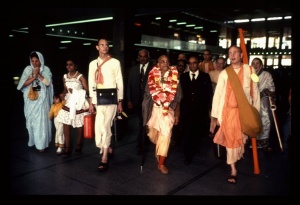SB 7.15.23: Difference between revisions
m (1 revision(s)) |
(Vanibot #0054 edit - transform synonyms into clickable links, which search similar occurrences) |
||
| (One intermediate revision by one other user not shown) | |||
| Line 1: | Line 1: | ||
{{info | {{info | ||
|speaker= | |speaker=Nārada Muni | ||
|listener=King | |listener=King Yudhiṣṭhira | ||
}} | }} | ||
[[Category:Srimad-Bhagavatam - Canto 07 Chapter 15]] | |||
[[Category:Bhagavatam Verses Spoken by Narada Muni - Vanisource|071523]] | |||
<div style="float:left">'''[[Srimad-Bhagavatam]] - [[SB 7|Seventh Canto]] - [[SB 7.15: Instructions for Civilized Human Beings|Chapter 15: Instructions for Civilized Human Beings]]'''</div> | |||
<div style="float:right">[[File:Go-previous.png|link=SB 7.15.22]] '''[[SB 7.15.22]] - [[SB 7.15.24]]''' [[File:Go-next.png|link=SB 7.15.24]]</div> | |||
{{RandomImage}} | |||
==== TEXT 23 ==== | ==== TEXT 23 ==== | ||
<div | <div class="verse"> | ||
ānvīkṣikyā śoka-mohau | :ānvīkṣikyā śoka-mohau | ||
dambhaṁ mahad-upāsayā | :dambhaṁ mahad-upāsayā | ||
yogāntarāyān maunena | :yogāntarāyān maunena | ||
hiṁsāṁ kāmādy-anīhayā | :hiṁsāṁ kāmādy-anīhayā | ||
</div> | </div> | ||
| Line 17: | Line 22: | ||
==== SYNONYMS ==== | ==== SYNONYMS ==== | ||
<div | <div class="synonyms"> | ||
''[//vanipedia.org/wiki/Special:VaniSearch?s=ānvīkṣikyā&tab=syno_o&ds=1 ānvīkṣikyā]'' — by deliberation upon material and spiritual subject matters; ''[//vanipedia.org/wiki/Special:VaniSearch?s=śoka&tab=syno_o&ds=1 śoka]'' — lamentation; ''[//vanipedia.org/wiki/Special:VaniSearch?s=mohau&tab=syno_o&ds=1 mohau]'' — and illusion; ''[//vanipedia.org/wiki/Special:VaniSearch?s=dambham&tab=syno_o&ds=1 dambham]'' — false pride; ''[//vanipedia.org/wiki/Special:VaniSearch?s=mahat&tab=syno_o&ds=1 mahat]'' — a Vaiṣṇava; ''[//vanipedia.org/wiki/Special:VaniSearch?s=upāsayā&tab=syno_o&ds=1 upāsayā]'' — by serving; ''[//vanipedia.org/wiki/Special:VaniSearch?s=yoga&tab=syno_o&ds=1 yoga]-[//vanipedia.org/wiki/Special:VaniSearch?s=antarāyān&tab=syno_o&ds=1 antarāyān]'' — obstacles on the path of yoga; ''[//vanipedia.org/wiki/Special:VaniSearch?s=maunena&tab=syno_o&ds=1 maunena]'' — by silence; ''[//vanipedia.org/wiki/Special:VaniSearch?s=hiṁsām&tab=syno_o&ds=1 hiṁsām]'' — envy; ''[//vanipedia.org/wiki/Special:VaniSearch?s=kāma&tab=syno_o&ds=1 kāma]-[//vanipedia.org/wiki/Special:VaniSearch?s=ādi&tab=syno_o&ds=1 ādi]'' — for sense gratification; ''[//vanipedia.org/wiki/Special:VaniSearch?s=anīhayā&tab=syno_o&ds=1 anīhayā]'' — without endeavor. | |||
</div> | </div> | ||
| Line 24: | Line 29: | ||
==== TRANSLATION ==== | ==== TRANSLATION ==== | ||
<div | <div class="translation"> | ||
By discussing spiritual knowledge one can conquer lamentation and illusion, by serving a great devotee one can become prideless, by keeping silent one can avoid obstacles on the path of mystic yoga, and simply by stopping sense gratification one can conquer envy. | By discussing spiritual knowledge one can conquer lamentation and illusion, by serving a great devotee one can become prideless, by keeping silent one can avoid obstacles on the path of mystic yoga, and simply by stopping sense gratification one can conquer envy. | ||
</div> | </div> | ||
| Line 31: | Line 36: | ||
==== PURPORT ==== | ==== PURPORT ==== | ||
<div | <div class="purport"> | ||
If one's son has died, one may certainly be affected by lamentation and illusion and cry for the dead son, but one may overcome lamentation and illusion by considering the verses of Bhagavad-gītā. | If one's son has died, one may certainly be affected by lamentation and illusion and cry for the dead son, but one may overcome lamentation and illusion by considering the verses of ''Bhagavad-gītā''. | ||
jātasya hi dhruvo mṛtyur | ''jātasya hi dhruvo mṛtyur'' | ||
dhruvaṁ janma mṛtasya ca | |||
As the soul transmigrates, one who has taken birth must give up the present body, and then he must certainly accept another body. This should be no cause for lamentation. Therefore Lord Kṛṣṇa says, dhīras tatra na muhyati: ([[BG 2.13]]) one who is dhīra, or sober, who is learned in philosophy and established in knowledge, cannot be unhappy over the transmigration of the soul. | ''dhruvaṁ janma mṛtasya ca'' | ||
As the soul transmigrates, one who has taken birth must give up the present body, and then he must certainly accept another body. This should be no cause for lamentation. Therefore Lord Kṛṣṇa says, ''dhīras tatra na muhyati'': ([[BG 2.13 (1972)|BG 2.13]]) one who is ''dhīra'', or sober, who is learned in philosophy and established in knowledge, cannot be unhappy over the transmigration of the soul. | |||
</div> | </div> | ||
__NOTOC__ | |||
<div style="float:right; clear:both;">[[File:Go-previous.png|link=SB 7.15.22]] '''[[SB 7.15.22]] - [[SB 7.15.24]]''' [[File:Go-next.png|link=SB 7.15.24]]</div> | |||
__NOTOC__ | |||
__NOEDITSECTION__ | |||
Latest revision as of 22:56, 18 February 2024

A.C. Bhaktivedanta Swami Prabhupada
TEXT 23
- ānvīkṣikyā śoka-mohau
- dambhaṁ mahad-upāsayā
- yogāntarāyān maunena
- hiṁsāṁ kāmādy-anīhayā
SYNONYMS
ānvīkṣikyā — by deliberation upon material and spiritual subject matters; śoka — lamentation; mohau — and illusion; dambham — false pride; mahat — a Vaiṣṇava; upāsayā — by serving; yoga-antarāyān — obstacles on the path of yoga; maunena — by silence; hiṁsām — envy; kāma-ādi — for sense gratification; anīhayā — without endeavor.
TRANSLATION
By discussing spiritual knowledge one can conquer lamentation and illusion, by serving a great devotee one can become prideless, by keeping silent one can avoid obstacles on the path of mystic yoga, and simply by stopping sense gratification one can conquer envy.
PURPORT
If one's son has died, one may certainly be affected by lamentation and illusion and cry for the dead son, but one may overcome lamentation and illusion by considering the verses of Bhagavad-gītā.
jātasya hi dhruvo mṛtyur
dhruvaṁ janma mṛtasya ca
As the soul transmigrates, one who has taken birth must give up the present body, and then he must certainly accept another body. This should be no cause for lamentation. Therefore Lord Kṛṣṇa says, dhīras tatra na muhyati: (BG 2.13) one who is dhīra, or sober, who is learned in philosophy and established in knowledge, cannot be unhappy over the transmigration of the soul.